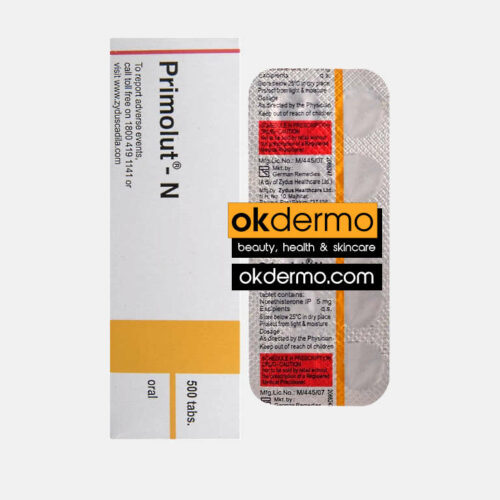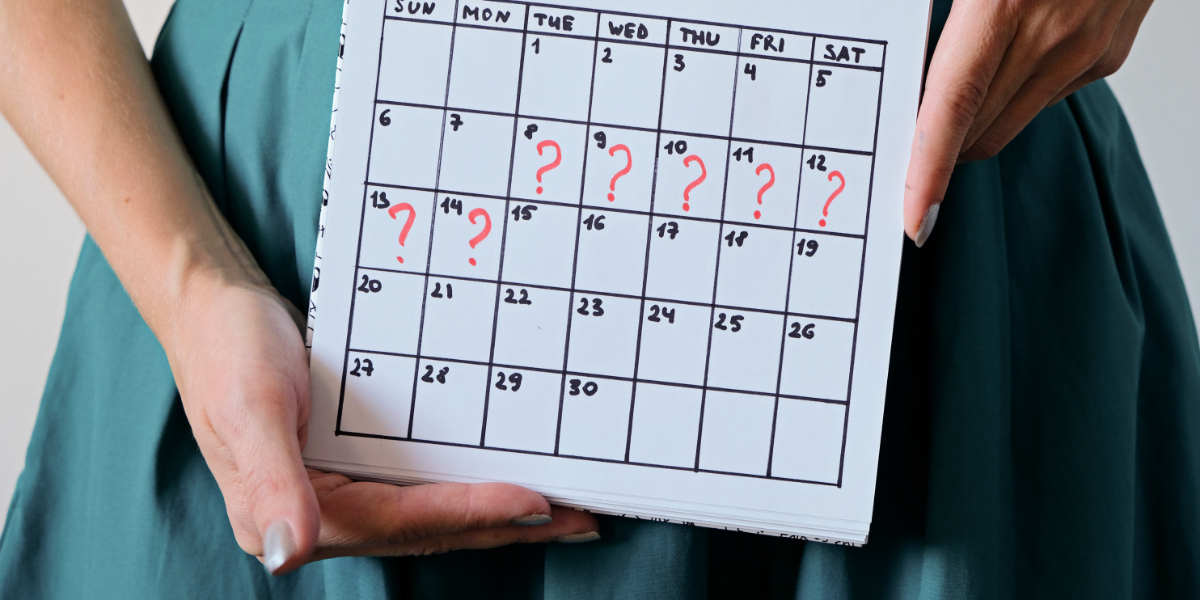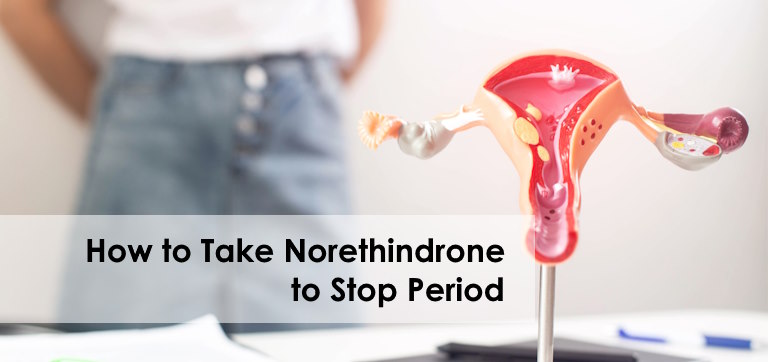How to Take Norethindrone to Stop Period
Table of Contents
Norethindrone is a synthetic progestin taken for menstrual regulation. Its primary use is stopping or delaying menstruation, offering individuals control over their menstrual cycles for various medical and personal reasons. By mimicking the effects of progesterone, a hormone naturally produced in the body, norethindrone suppresses ovulation and alters the uterine lining, preventing the shedding of the endometrium that leads to menstrual bleeding.
Understanding the significance of dosage and timing is important for maximizing the efficacy of norethindrone. Failure to stick to the recommended dosage or timing may compromise its ability to suppress menstruation effectively, leading to breakthrough bleeding or other undesirable outcomes.
In this guide, common questions related to norethindrone tablet use such as how to take norethindrone to stop period, what happens if you take norethisterone on first day of period, norethindrone dosage to stop period, does norethindrone stop periods, how long after taking norethisterone will my period start, and is it safe to take period delay tablets will be addressed as well as additional information such as norethisterone side effects, list of tablets to postpone periods and pills to stop menstruation immediately.
Does Norethindrone Stop Periods?
Norethindrone can stop periods by affecting hormone levels in the body. Here’s how it works:
- Suppression of Ovulation: Norethindrone blocks certain hormones that trigger ovulation (the release of an egg). This disrupts the normal cycle of egg release from the ovaries.
- Thickening of Cervical Mucus: This makes it harder for sperm to swim through the cervix to reach the egg, reducing the chance of pregnancy.
- Alteration of Uterine Endometrial Lining: Norethindrone alters the lining of the uterus, making it less likely for a fertilized egg to attach and grow.
However, it’s important to note that Norethindrone might not stop periods completely in all cases. Some may still have light bleeding or spotting, especially when starting the medication or if doses are missed or taken irregularly.
-

Primolut-N® Norethisterone Tablets
Norethisterone 5mg
Size: 60 Tablets
Brand name: Aygestin, Camila, Errin, Jolivette, Lyza, Nora-BE, Nor-QD, Ortho Micronor, Norethindrone
USD $34.00 Add to cart
How to Take Norethindrone to Stop Period
Taking norethindrone to stop period requires adherence to a prescribed regimen.
- Consultation and Prescription: Initiate the process by consulting a healthcare provider who can assess your medical history and determine the suitability of norethindrone for your needs. Upon evaluation, if deemed appropriate, your provider will issue a prescription tailored to your individual needs.
- Understanding Dosage: Dosage requirements may vary depending on factors such as the reason for menstrual suppression and your overall health status.
- Starting Treatment: Take norethindrone as directed. Typically, this involves initiating treatment on a specific day of your menstrual cycle as it can effect treatment efficacy.
- Consistency: Adhere to the prescribed dosage and schedule. Take norethindrone at the same time each day to maintain consistency and optimize its effectiveness.
- Monitoring and Adjustment: Notice any adverse effects or irregularities while taking norethindrone. Report any concerns promptly to your healthcare provider, who may need to adjust your dosage or provide further guidance based on your individual response to the medication.
- Completion of Course: Complete the prescribed course of norethindrone as directed, even if menstruation ceases before the scheduled end of treatment. Abrupt discontinuation may lead to breakthrough bleeding or other complications.
Norethindrone Dosage to Stop Period
Norethindrone dosage to stop period guidelines are as follows, adherence to which is essential to ensures safety, and efficacy of the treatment.
-
- The typical dosage for using norethindrone to stop menstruation ranges between 2.5 to 10 milligrams daily.
- Initiation of norethindrone may occur on the first day of menstrual bleeding or at a prescribed point in the menstrual cycle as directed by a healthcare provider.
What Happens if You Take Norethisterone on First Day of Period
When taken at the onset of menstruation, Norethisterone works by suppressing the natural hormonal fluctuations that trigger menstruation, thereby postponing bleeding.
Potential outcomes of what happens if you take norethisterone on first day of period may include:
- Delayed Menstruation: By inhibiting the release of hormones responsible for initiating menstruation, Norethisterone can delay the onset of menstrual bleeding.
- Reduced Menstrual Flow: Norethisterone may lead to lighter or shorter periods by limiting the buildup of the uterine lining, resulting in less bleeding during menstruation.
- Altered Menstrual Cycle: Taking Norethisterone at the beginning of the menstrual cycle can disrupt the natural hormonal rhythm, causing irregularities in subsequent cycles.
- Management of Menstrual Disorders: Norethisterone is also used therapeutically to manage conditions such as heavy menstrual bleeding, menstrual pain, and irregular cycles.
How Long After Taking Norethisterone Will My Period Start?
how long after taking norethisterone will my period start is a commonly raised concern. The time it takes for your period to start after taking Norethisterone can vary. Generally, you can expect your period to begin within 1 to 3 days after finishing a course of Norethisterone. However, several factors can influence this timing:
- Dosage and Duration: Higher doses or longer treatment periods may lead to quicker period onset.
- Timing of Taking the Medication: Starting Norethisterone at the beginning of your period or just before it is due can help speed up the process.
- Individual Response: Your body’s unique hormonal balance and sensitivity to the medication can affect how quickly your period starts after taking Norethisterone.
- Health Conditions: Certain underlying health issues may impact the effectiveness of Norethisterone and the timing of your period. Your doctor may need to consider these factors when prescribing the medication.
- Following the Treatment Plan: It’s important to take Norethisterone as directed by your doctor. Missing doses or not following the schedule may delay the start of your period or lead to irregular bleeding.
While most people will see their period start within a few days of taking Norethisterone, individual experiences may vary based on these factors.
Is it Safe to Take Period Delay Tablets?
The question of whether is it safe to take period delay tablets requires careful consideration due to potential risks and individual health factors. However, they are generally safe when used as directed by a healthcare professional.
Following are some factors to consider:
- Potential Norethisterone Side Effects: Like any medication, period delay tablets may be associated with side effects, such as nausea, headache, breast tenderness, and mood changes. Individuals with certain medical conditions or sensitivities to hormonal medications may be at a higher risk of experiencing adverse reactions.
- Impact on Hormonal Balance: Period delay tablets, particularly those containing synthetic hormones like Norethindrone, can disrupt the natural hormonal balance within the body. Prolonged or frequent use of these medications without medical supervision may lead to hormonal imbalances, irregular menstrual cycles, or other complications.
- Underlying Health Conditions: Individuals with certain health conditions, such as liver disease, cardiovascular disorders, or a history of blood clots, may have contraindications or increased risks associated with the use of period delay tablets. It is crucial for individuals with pre-existing medical conditions to consult with a healthcare provider before initiating any medication.
- Interactions with Other Medications: Period delay tablets, particularly those containing hormones, may interact with other medications, supplements, or herbal remedies. These interactions can affect the efficacy and safety of both the period delay tablets and other concurrently used substances. Healthcare providers can assess potential interactions and provide guidance on safe medication use.
- Individualized Assessment: The decision to use period delay tablets should be based on an individualized assessment of risks and benefits, taking into account factors such as age, reproductive history, lifestyle, and personal preferences. Consulting with a healthcare provider allows for personalized evaluation and recommendations tailored to individual needs.

Norethisterone Side Effects
Norethisterone, like any medication, can potentially cause side effects, although not everyone experiences them. Common norethisterone side effects may include:
- Nausea and Vomiting: Some individuals may experience gastrointestinal disturbances, such as nausea or vomiting, particularly during the initial stages of treatment.
- Headache: Headaches are a commonly reported side effect of Norethisterone use, which may vary in severity and frequency.
- Breast Tenderness: Norethisterone can cause breast tenderness or discomfort.
- Changes in Menstrual Bleeding: While Norethisterone is often used to regulate menstrual bleeding, some individuals may experience irregular bleeding or spotting, especially during the initial stages of treatment.
- Mood Changes: Mood swings, irritability, or changes in emotional well-being have been reported by some individuals using Norethisterone.
- Fluid Retention: Fluid retention leading to bloating or swelling of extremities may occur in some individuals.
- Skin Changes: Norethisterone may contribute to changes in skin condition, such as acne or worsening of existing acne.
It is important to note that the occurrence and severity of side effects can vary among individuals. You should seek prompt medical assistance if they experience any of the following:
- Severe or persistent headaches
- Chest pain or shortness of breath
- Sudden vision changes or disturbances
- Severe abdominal pain or swelling
- Signs of allergic reaction, such as rash, itching, swelling, or difficulty breathing
List of Tablets to Postpone Periods
In addition to norethindrone, the following list of tablets to postpone periods can be used as prescribed.
- Medroxyprogesterone Acetate: This medication, commonly sold under the brand name Provera, is another synthetic hormone that works similarly to Norethisterone in delaying menstruation. It’s available in tablet form and may be prescribed for period postponement.
- Combined Oral Contraceptives (COCs): Some types of combined birth control pills can be used to postpone periods. These pills contain a combination of estrogen and progestin hormones and are taken in a specific way to delay menstruation. Common brand names include Ortho Tri-Cyclen, Yasmin, and Loestrin.
- Levonorgestrel: Levonorgestrel is a progestin-only emergency contraceptive pill that can also be used off-label to postpone periods. It’s usually taken in higher doses than those used for emergency contraception. Common brand names include Plan B and Next Choice.
- Dydrogesterone: Dydrogesterone is a synthetic hormone similar to progesterone, and it can be prescribed to delay periods in certain situations. It’s often used in combination with estrogen for hormone replacement therapy but can also be used alone for period postponement. It’s commonly sold under the brand name Duphaston.
- Gonadotropin-Releasing Hormone (GnRH) Agonists: These medications, such as leuprolide acetate, work by temporarily suppressing ovarian function and can be used to postpone periods in specific medical conditions, such as endometriosis or uterine fibroids. They are usually administered by injection rather than in tablet form.
Frequently Asked Questions (FAQs) About Norethindrone Pills
How quickly does norethindrone stop bleeding?
Norethindrone can typically stop bleeding within 1 to 3 days of starting the medication. However, the exact timeframe may vary among individuals. When it comes to pills to stop menstruation immediately, norethindrone has a fast onset of action working as soon as within one day in some cases.
Can I take norethisterone to stop my period once it has started?
Yes, norethindrone can be taken to stop your period even after it has started. However, initiating the medication earlier in your menstrual cycle, ideally at the first signs of menstruation may lead to quicker cessation of bleeding.
How do you take norethindrone to skip your period?
To skip your period using norethindrone, you typically start taking the medication several days before the expected onset of menstruation. The exact timing and dosage will depend on your individual circumstances and healthcare provider’s recommendations. It’s essential to continue taking norethindrone as directed for the desired duration of period suppression.
Can you take norethindrone while on your period?
Yes, norethindrone can be taken while on your period to help stop or shorten menstrual bleeding. Initiating norethindrone therapy during menstruation may still be effective in suppressing bleeding, although it may take slightly longer to achieve the desired outcome compared to starting the medication before menstruation begins.
References:
- https://link.springer.com/article/10.1186/s12905-019-0766-6
- https://www.sciencedirect.com/science/article/abs/pii/0378512296010055
- https://journals.lww.com/clinicalobgyn/abstract/2014/09000/progesterone.15.aspx
- https://www.sciencedirect.com/science/article/abs/pii/S1701216315304424
- https://www.degruyter.com/document/doi/10.1515/jpem-2023-0133/html
- https://www.sciencedirect.com/science/article/abs/pii/0010782482900786
Post by:
Dr.Marcella Jiovanni
Health and Beauty Expert
“Marcella Jiovanni actively promotes the importance of maintaining healthy skin, she envisions the future of dermatology as moving away from pure medical, pharmacological dermatology and flowing more toward a holistic approach to wellness and skincare.”

















